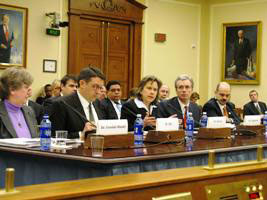 |
|||
| College of Education Home | News & Events | Make a Gift | UW Alumni | |||
|
May 2009 | Return to issue home
Dr. Bell Goes to Washington for Informal STEM Education
Editors note: Portions of the following are reprinted from a Feb. 26, 2009 press release. Philip Bell, associate professor at the UW College of Education and director of the UW Institute for Science and Math, recently testified before the Science and Technology’s Subcommittee on Research and Science Education in Washington, D.C., at a hearing held to examine the role of informal environments in promoting science, technology engineering and mathematics (STEM) learning. Subcommittee members heard testimony on the National Academies report, Learning Science in Informal Environments: People, Places, and Pursuits. "The Science and Technology committee, and our subcommittee in particular, has made STEM education a top priority," said subcommittee Chairman Daniel Lipinski (D-IL). "While we often examine and discuss ways to improve STEM education in the classroom, we rarely look at the many opportunities for learning elsewhere. A great deal of learning happens throughout our lives in everyday activities—from having a conversation at the family dinner table to attending a summer camp at a zoo." As previously reported, the Learning Science in Informal Environments report provided recommendations for future research and practice of STEM education. The report found ample evidence to suggest that science learning takes place throughout people’s lives and in many avenues besides the classroom. The report examined four areas where informal learning most often takes place: everyday experiences; designed spaces, such as museums, zoos, etc.; after-school educational programs; and science media, such as television programs and Web sites. As Bell testified, "My research group investigates how youth and families from multicultural, urban communities develop science and technology related expertise across different settings. In our research, we have found a surprising and troubling pattern where children pursue and engage in sophisticated STEM learning outside of school but those interests and early competencies are not recognized or built upon in the classroom…Our research further indicates that STEM academic achievement, although crucial, is only part of what is needed to cultivate expertise in STEM—people’s activities in informal environments are an equally crucial platform for learning." In addition, the report found that informal environments can have a significant impact on STEM learning outcomes in historically underrepresented groups and may be uniquely positioned to make STEM education accessible to all. "That is why I am interested in the role of informal education in attracting more people to STEM fields, especially those who are not typically exposed to these areas in their communities," added Lipinski. "We ought to look at ways in which informal STEM environments may be uniquely positioned to make STEM learning accessible to a broader demographic by helping formal educators excite and engage their students." In 2005, the National Academies recommended, in the Rising Above the Gathering Storm report, that the nation improve K-12 science and mathematics education. So, the committee created legislation, the America COMPETES Act, that was signed into law in 2007 to foster innovation in America and support STEM education. COMPETES ensures not only that our nation will produce the world’s leading scientists and engineers but also that all students will have a strong grounding in math and science and are prepared for technical jobs in every sector of the economy. May 2009 | Return to issue home | |||
|
|||
